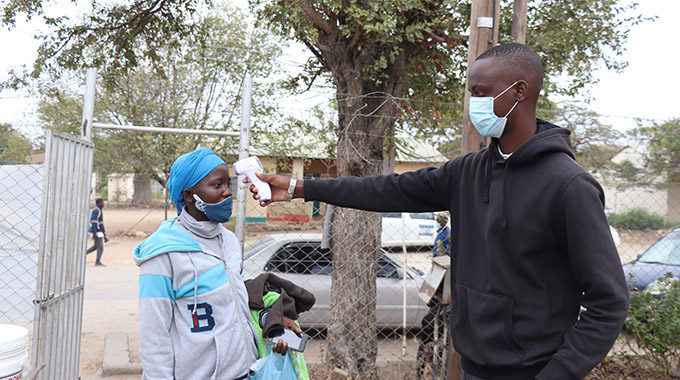Zim’s Environmental Health Technician officers follow WHO guidelines for early detection of COVID-19 symptoms

Tatenda Chimbwanda Correspondent
To all patients who visit Beitbridge District Hospital, Mmoloki Malemane seems like just any other person who checks people’s temperatures at the gate. To those not aware of his role, this might seem the case yet Mmokoli is an Environmental Health Technician (EHT) responsible for COVID-19 prescreening at Beitbridge Hospital.
As an EHT officer, Mmokoli works in the public sector to identify and correct various environmental health issues. His duties include examinining the environment and its impact on the population, determine what issues may exist within it, and then work to find a way to combat the problems.

“I spend the whole day standing by the entrance and pre-screening people for COVID-19. I follow the strict WHO guidelines on Infection Prevention Control (IPC) measures. That’s my role in the fight against COVID-19,” says Mmoloki.
Understanding the gravity of COVID-19, especially in Beitbridge, motivates Mmokoli to spend the whole day at the hospital entrance. Beitbridge falls under Matebeleland South which has the third-highest number of COVID-19 cases in Zimbabwe.
This is because Beitbridge shares the border with South Africa and the town receives returnees frequently from the neighbouring country.
Zimbabwean returnees who have illegally crossed the border (border jumpers) from South Africa also contribute to Beitbridge’s high burden of COVID-19 positive cases as they are not tested and quarantined when returning to the country. Mmoloki continuously makes sure he is on high alert to detect early COVID-19 symptoms.
For anyone whose temperature is not within the normal range, Mmokoli immediately calls nurses in appropriate Personal Protective Equipment (PPE) to test them for COVID-19.
“Just this week we had two cases l detected during pre-screening. They had high temperatures, were tested for COVID-19 first, but tested negative. Later on they tested positive for malaria,” noted Mmokoli.
If a patient tests positive, nurses immediately call an ambulance to transport him or her to Beitbridge Rainbow Hotel, which is a Community Isolation Centre.
Here, the patient will be closely monitored for ten days to ensure he or she does not develop any critical symptoms. If they do not, the patient is sent home to self-isolate.
In the event that the condition becomes severe or critical the patient will be moved to Mater Dei Hospital in Bulawayo. The latter, has the capacity for ICU admissions and management of server and critical cases.
The steps that Mmokoli follows as he does his daily COVID-19 screening are a result of training conducted by their District EHT officer on the WHO recommended IPC measures.
Mmokoli’s training has been supported by the Ministry of Health and Child Care (MoHCC) with technical backing from WHO.
His mentor was also taught by the Matebeleland South Provincial EHT officers who were trained by national IPC members.
Thanks to UKaid generous funding, WHO was able to support MoHCC build capacity in IPC. This was done to have the trickledown effect, which has capacitated Mmokoli to play his role in mitigating COVID-19 through prescreening measures and early detection of symptoms.
The process that led to Mmokoli’s teaching began with National IPC pillar members training a group of national trainers under MoHCC. The national trainers then taught provincial coaches.
The provincial trainers further taught district level mentors per region. District level trainers then cascaded what they learnt to facilities in their areas.
WHO continues to support MoHCC with guidelines on IPC measures to follow when conducting COVID-19 pre-screening.
The guidelines stipulate the measures health care workers like Mmokoli should take to protect themselves from COVID-19. Most importantly, the guidelines stipulate how to detect early symptoms of COVID-19.
COVID-19 prescreening at hospitals is mandatory for all health care facilities in Zimbabwe as per MoHCC regulations recommended by WHO.
All health care facilities in Zimbabwe continue to follow WHO guidelines as they conduct COVID-19 prescreening. This has helped control health facilities’ exposure to COVID-19 as they deliver essential health care services to patients.
- The story was provided by the World Health Organisation Zimbabwe office










Comments